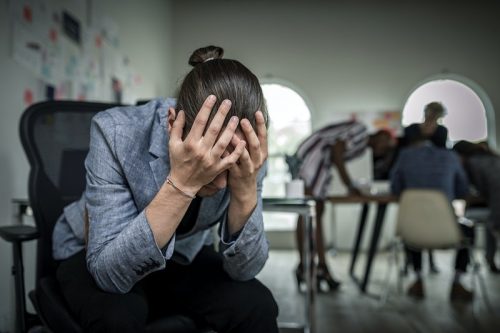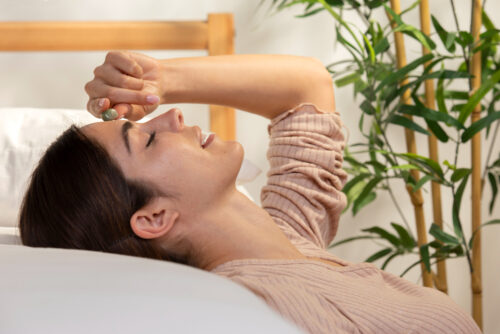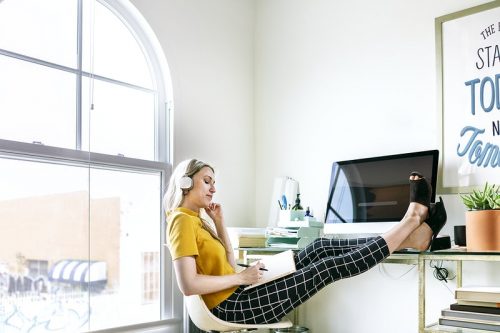
Source: rawpixel.com
For a year, I didn’t have any idea that what I had was an anxiety disorder. I was disrupted at work, and I was temperamental and emotional with my kids. I felt that I was becoming a bad mom, so I took a leave from work to clear my head. I once read that taking time off can help a person feel better and less depressed.
However, after two weeks of cooking, reading my favorite novels, and staying at home, my mental well-being had significantly plunged. I was often crying myself to sleep, my appetite was erratic – eating too much and then nothing at all, and I was deprived of sufficient sleep.
Fortunately, the healthcare professional was very helpful and understood completely what my main issue was. He explained that what I believed was something work-related was actually a debilitating case of depression.
At the onset, I allowed it to remain floating just under the surface while I focused on looking for ways to alleviate the depressive and anxiety symptoms. I began a course of antidepressant medications and started the habit of doing vigorous physical activities. These two methods and resigning from my stressful career helped pacify the severe symptoms of anxiety like numbness, frustration, hopelessness, and suicidal ideations.
What is Crippling Anxiety?
Everyone experiences anxiety from time to time. For example, feeling nervous before a thesis defense is expected. However, if you constantly feel anxious that completing daily tasks can be very challenging, you might be experiencing crippling anxiety. It is the most common term to describe it that significantly impacts a person’s daily life.
Crippling anxiety is a prevalent mental health condition affecting millions of people worldwide. Based on the statistics from the World Health Organization (WHO), around 264 million people around the world suffer from anxiety disorders, with women being more susceptible to it than men. While statistics on the prevalence of crippling anxiety specifically are harder to come by, it is estimated that a big portion of these individuals with this disorder experience severe anxiety symptoms that can be debilitating.
Discussions about anxiety are crucial as they help to reduce the stigma associated with mental health conditions. By discussing anxiety, we can raise awareness and provide support for those who are struggling with anxiety. Additionally, discussions around crippling anxiety can help individuals recognize the anxiety symptoms and seek help from mental health professionals, which can improve their quality of life.

Source: rawpixel.com
Coping Mechanisms for Crippling Anxiety
Mindfulness and Meditation
Mindfulness and meditation practices can be helpful in managing crippling anxiety. These practices involve focusing on the present moment and accepting thoughts and feelings without judgment. Research has shown that mindfulness and meditation can reduce symptoms by improving emotional regulation, decreasing stress levels, and promoting relaxation.
Exercise and Physical Activity
When you’re feeling worried, engaging in regular physical activity can help reduce symptoms. Exercise helps to release endorphins, which can boost mood and reduce feelings of anxiety. Additionally, regular exercise can improve sleep quality, which is often disrupted in people with anxiety.
Seeking Therapy and Professional Help
Therapy and counseling can be effective treatment options for anxiety. As stated by the Anxiety and Depression Association of America, cognitive-behavioral therapy is a highly-effective treatment to manage anxiety. Cognitive-behavioral therapy (CBT) is a medically reviewed, common therapy approach that focuses on reforming negative behaviors and thinking. CBT can help individuals learn coping strategies and problem-solving skills to manage worried feelings, social anxiety, and other worries. Other therapy approaches, such as exposure therapy and acceptance and commitment therapy (ACT), can also help treat anxiety.
It is essential to seek professional help if it is impacting your daily life significantly. The mental health experts will be able to determine the things that start your fear response. They can provide an accurate diagnosis, develop a treatment plan, and provide support, sound medical advice, and guidance throughout the recovery process.
Remember that coping mechanisms for anxiety may vary from person to person, and it is essential to find what works best for you. To treat anxiety and panic attacks, it is also important to practice self-care and engage in activities that bring you joy and relaxation.
I supplemented myself with more knowledge about anxiety. Here’s what I learned about it through these frequently asked questions and their corresponding answers.

Source: freepik.com
What Is The Top Treatment For Crippling Anxiety?
The most effective ways to help treat severe anxiety include:
- Keeping yourself active by doing physical exercise
- Avoiding alcohol and caffeine
- Getting sufficient sleep
- Quitting smoking
- Maintaining a healthy and balanced diet.
- Learning and practicing meditation and deep breathing exercises
How To Deal With Crippling Anxiety?
When your anxiety is crippling – meaning that it overwhelms you to the extent that you cannot regularly perform your daily functions – then you may be having an anxiety disorder. With anxiety, you should first identify the potential triggers for why you feel anxious. Learn to identify the kind of thoughts and associated behaviors that might lead you to experience anxiety and panic, and then change them.
How To Help Someone With Crippling Anxiety?
To effectively help a person with crippling anxiety, you should be someone that he can rely on, someone he can trust to tell you how he feels. Talk to this person and encourage him to try to stay physically active every day. Urge him to learn new things so that he becomes energized and interested. If the symptoms seem difficult to manage, encourage him to find help from local organizations or human services with mental health expertise.
What Treatment Is Effective For Crippling Anxiety?
Psychotherapy (also called psychological counseling or talk therapy) is considered the most effective in treating anxiety disorders like generalized anxiety disorder. Cognitive-Behavioral Therapy usually involves changing thinking and behavioral patterns that can exacerbate anxious feelings. Much research suggests that CBT is effective in treating many types of mental health disorders like panic disorder, generalized anxiety disorder, and social anxiety disorder.

Source: freepik.com
What are the various treatment options available for anxiety disorders?
Tranquilizers, commonly known as benzodiazepines, are among the most popularly prescribed choice for treating crippling anxiety. Examples of these include Lorazepam, diazepam, clonazepam, and alprazolam work fast, usually producing relief within 30 minutes to one hour.
What is the latest treatment for anxiety?
Ketamine was previously sanctioned by the FDA and classified as an anesthetic. However, it has been increasingly utilized to manage mood disorders, depression, PTSD, and anxiety disorders.
Does CBD help anxiety?
CBD was found to benefit individuals with other anxiety types, like posttraumatic disorder and social anxiety disorder. It may also help alleviate anxiety-induced insomnia.
What is the best mood stabilizer for anxiety?
Individuals who unsuccessfully responded to mood stabilizers, including lithium, had shown positive outcomes when treated with lamotrigine. It has minor side effects that gradually disappear after a relatively short time.
What is the best non-addictive anti-anxiety medication?
Selective serotonin reuptake inhibitors (SSRIs) are among the most popularly used forms of prescription medications for anxiety. They are often the first choice of psychiatrists, as they are very efficient for treating anxiety, are not addictive, do not cause impairment of memory, and have minor side effects.
Does anxiety medication help with physical symptoms?
Anxiety medications and therapy are the two basic treatment options for anxiety. If you have physical indications, you can take medications or go through talk therapy. These also lead to the improvement of your anxiety symptoms.
Do you have to take anxiety medication forever?
General guidelines for treating crippling anxiety suggest that for the initial treatment, keeping individuals on medication when they completely respond and are basically symptom-free for about one or two years seems practical and reasonable.
What can you take besides Xanax for anxiety?
Other alternatives for Xanax include benzodiazepines such as Lorazepam, diazepam, or clonazepam. All of these are equally as effective as Xanax.
Does Benadryl help with anxiety?
One of the most common benefits of utilizing an over-the-counter medicine like Benadryl to manage crippling anxiety is that it works quickly and is more convenient. This can be effective if you have to decrease your symptoms of mild anxiety fast.
What is the best Benzo for anxiety?
Both Xanax and Ativan were shown to produce more positive outcomes compared to placebo, but Xanax proved to be more effective in several studies performed. But in another study using these drugs for anxiety, Ativan was more effective.

Source: rawpixel.com
Conclusion
After reading and following the tips and recommendations that my doctor recommended me, along with the healthy habits that I learned and practiced, I finally reclaimed the confidence that I lost for quite some time. I chose to work from home, which permitted me to keep track of my family while earning from my abode’s comfort. It felt so rewarding to be able to deal with the workload. When my anxiety appeared and attempted to control me, I then knew how to manage it and still maintain healthy physically and mentally.
Indeed, there is no magic pill that can get rid of it and go back to normal life. However, there is plenty of hope for those suffering from it. Identifying what triggers anxiety will tremendously help you anticipate what’s coming before they even arise.
